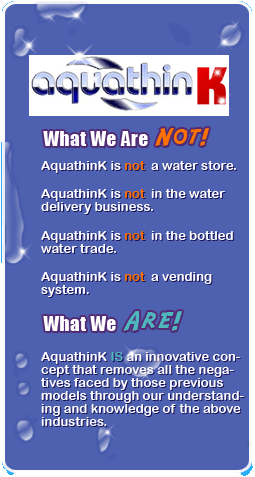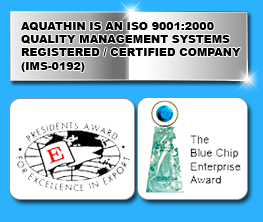
Why AquathinK
Aquathin, was established in 1980 and for over 30+ Years Pure Excellence, we have earned seven patents. Aquathin now produces over 70 trademarked devices for markets around the world through almost 600 Authorized Aquathin Dealers. Aquathin is an E.P.A. registered manufacturer, ISO 9001:2000 Certified and recipient of the prestigious President's Excellence Award in Export from the U.S. Commerce Department and the Nation's Blue Chip Enterprise Award from the U.S. Chamber of Commerce. A global Customer list is available to interested parties.

COMPARISON CHART:
| |
| |
Centers |
Bottled Water |
Water Stores
& Vending |
| |
| Customer Loyalty |
 |
 |
 |
Delivery logistics
(trucks, fuel, similar) |
 |
 |
 |
Delivering through traffic
congested areas |
 |
 |
 |
Cost of bottles, caps, employees,
insurance, storage of empty bottles. |
 |
 |
 |
Machinery
(blow molding, fillers, washers, cappers, conveyors, ozone, wrapping, packaging, labeling, racking, trucks) |
 |
 |
 |
| Maintenance and ongoing expenses of plant, systems, testing, certifications and similar |
 |
 |
 |
| Costly Advertising |
 |
 |
 |
| Rapid Return on Investment |
 |
 |
 |
| Social responsibility |
 |
 |
 |
| Environmental Friendliness |
 |
 |
 |
Ease of permits and draining
of local resources |
 |
 |
 |
| Product knowledge |
 |
 |
 |
Multi-use of water
(washing foods, cooking & drinking) |
 |
 |
 |
Forced price reductions to
match competition |
 |
 |
 |
| Waste and Pollution (see 1 below) |
 |
 |
 |
| Cost to produce bottled water |
 |
 |
 |
| Water quality monitoring |

Every Second
|
 |
 |
| |
| A = EXCELLENT B = GOOD C = FAIR D = POOR F = Fail |
| |
(1) More than 1 billion water bottles are winding up in the trash in California alone each year, according to a report released May 29, 2003 by the California Department of Conservation. That translates into nearly 3 million empty water bottles going to the trash every day. Plastic water bags, a popular method for providing inexpensive water by substituting cheap bags for bottles, are so much strewn in the streets of countries like Haiti and Ecuador, that those governments are seeking legislation to stop the sales for these products. A rapidly growing water contaminate and environmental concern is "xenobiotics, xenoestrogens" [ from Greek 'xenos' meaning strange, foreign. Xenobiotics are synthetic products not formed by natural biosynthetic processes; a foreign substance or poison ] as a result of the destruction of plastics. All this non biodegradable plastic is going to the landfill and incineration. Landfills generate heat from composting. Offgassing from landfills and incinerators place xenos into the air. Rain absorbs and brings into our soil, streams. The production of many novel xenobiotics has introduced into the environment many compounds that microorganisms normally do not encounter and are therefore not prepared to biodegrade (hence the fear of voluminous empties). Many of these compounds are toxic to living systems, and their presence in aquatic and terrestrial habitats often has serious ecological consequences, including major kills of indigenous biota (that's plants, you and me!). |
|










